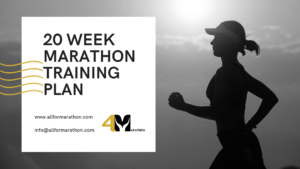How do you know that you are a runner? When you don’t rest but taper.
This is a small joke that is being told around the running community. For those who never heard of the word “Taper”, tapering basically means resting prior to the race day.
The joke illustrates the importance of rest before the competition starts. Slowing down and resting prior to the big race is so vital, that somebody has come up with a specific “running word” for resting.
When we talk about the so-called taper week, taper period, or marathon taper, what do we mean by that?
Marathon taper is the period of time, a week or more weeks, leading up to a marathon where runners gradually reduce their training volume and intensity in order to allow their bodies to recover and prepare for the race.
The taper period typically involves shorter and easier runs, as well as a reduction in strength training and other types of cross-training. The goal is to maintain the runner’s fitness level while allowing the body to recover from the intense training leading up to the race.
The exact duration of the taper period can vary depending on the runner’s individual training plan, but it generally lasts for 1-3 weeks leading up to the race.
Pre-race nutrition
In addition to reducing training volume, the taper period also involves paying close attention to nutrition, hydration, and sleep to ensure that the body is fully prepared for the race.

Many runners often come up with a pre-race meal plan for the week and days leading up to the marathon. A plan built to ensure that the body has all the nutrition it needs while keeping its body weight in order to be able to reach the desired performance.
Race week nutrition strategy often involves increasing carbohydrate intake (carb loading) to fill up with muscle glycogen, avoiding empty calories and too much-processed food, and a strong focus on proper hydration. Pre-race breakfast is also an extremely important part of it and we will discuss it further in this article.
The key takeaway from this article is that tapering should be an integral part of your marathon training, as it helps to reduce fatigue and prepare the body so it may fully recover and perform at its best on race day. Ignoring it may lead to a very painful experience that might leave you demotivated and hurt.
Main Rules For Eating During a Taper Week
Remember, everybody is unique and things that work for me don’t necessarily work for you as well. Nevertheless, there are some rules about what to eat before a marathon that seems to work for most runners.
Increase carbohydrate intake
To maximize your glycogen stores at the starting line, aim to consume extra carbs during the taper week. This can be achieved by increasing your intake of grains (bread), starchy vegetables (potatoes, sweet potatoes), fruits (bananas), corn, pasta, white or brown rice.
What is glycogen and why do you need it? It is a substance on the basis of glucose (sugar) stored in your muscles. It is primarily used to fuel up the working muscles during so-called anaerobic exercise which constitutes most of your long runs. Glycogen fuel stores start to get depleted in about 1-2 hours of running, which is why you need to replenish some carbs not only after but during the marathon itself.
Eat a balanced diet
Your body needs much more than just carbs. Make sure your meals include a variety of proteins, healthy fats, iron, and antioxidants-rich foods. All of them are necessary for a reason.
Proteins are essential for muscle recovery and repair. During taper week, athletes should consume protein-rich foods such as lean meat, fish, eggs, and beans.
Healthy fats are an important source of energy for the body, and they help to keep you feeling full and satisfied. Good sources of healthy fats include nuts, seeds, avocados, and olive oil.
:max_bytes(150000):strip_icc()/Healthy-Fats-Food-GettyImages-1301412044-2000-8ab23a10624d42df85fa3f37d7c76a6b.jpg)
Iron is critical for carrying oxygen to the muscles, and athletes should consume iron-rich foods such as lean red meat, spinach, and beans to help maintain healthy iron levels.
Antioxidants (polyphenols) help to reduce inflammation in the body, and they can aid in recovery. Foods rich in antioxidants include berries, leafy greens, and dark chocolate.
Reduce calorie intake
Since you’ll be running less during the taper week, it’s important to reduce your overall calorie intake to avoid body weight gain. However, don’t cut calories drastically, as you still need enough fuel to support your body’s needs.
You definitely want to avoid so-called empty calories that are mostly present in super-processed food. Quick sugars in sweets or soft drinks rapidly increase your blood sugar leading to a spike in your insulin levels, which causes metabolic abnormalities. You might feel overexcited, dizzy, even anxious, and later tired. Contrary to more complex sugars (carbohydrates), quick sugars do not get stored in muscles for later use.
Stay hydrated
Proper hydration is essential for optimal performance and recovery. The most essential and simple rule is to aim to drink plenty of water throughout the day. You might also consider adding electrolyte-rich fluids such as sports drinks to your routine. But before you do so, I suggest learning more about the topic and mostly, testing in the training not in the race.
4 Reasons To Increase Your Carbohydrate Intake
Probably the main thing I want you to remember to do in the week leading to a marathon is to increase the intake of complex sugars (carbohydrates). Let’s summarize why it might be a good idea.

Boost of glycogen stores
Glycogen is the primary fuel source for endurance athletes, and carbo-loading can help to increase glycogen stores in the muscles and liver. This can delay fatigue and improve endurance during a marathon.
Improved performance
Studies have shown that carbohydrate loading can improve performance in endurance events such as marathons. By increasing glycogen stores, the body has a greater supply of fuel, which can improve performance and reduce the risk of hitting the wall.
Reduced the risk of hypoglycemia
During a marathon, blood glucose levels can drop, leading to fatigue and impaired performance. By increasing carbohydrate intake before the race, you can reduce the risk of hypoglycemia and maintain energy levels throughout the race.
Enhanced recovery
Carbohydrates are also important for recovery after exercise, as they help to replenish glycogen stores and repair muscle tissue. By consuming a carbohydrate-rich diet before the race, you can improve recovery and reduce muscle damage.
How To Prevent an Upset Stomach During a Marathon?
There is nothing worse than experiencing gastrointestinal distress on the day you have trained for so long. In the rest of this article, we will focus on what your race-day nutrition should or shouldn’t look like in order to minimize the risks of stomach issues when the race starts.

Don’t try anything new
Race day is not the time to experiment with new foods, food or drink. Stick with food and beverages that you have tried and tested during your training.
Eat no or light breakfast
The ideal situation is to fully digest everything in your stomach before the marathon starts. Personally, I don’t eat at all as I describe in the further chapter. If you really need to eat something, choose small meals.
Avoid spicy or acidic foods
Spicy or acidic foods can cause heartburn or other digestive issues during the race.
Avoid caffeine and alcohol
Caffeine and alcohol can both cause distress, so it’s best to avoid them the night before and during the race.
Use the bathroom before the race
Entering a big competition may often cause excitement or stress, especially if it is your first marathon. It is highly recommended to poop in the morning prior to the marathon race to empty your bowels and not to feel any pressure inside. Same thing with emptying your bladder before the race. This will help you to keep your focus on the event.
What’s Your Marathon Breakfast?
While most articles online will advise you to eat a complex carbohydrate-rich breakfast the morning before running a marathon, my personal experience has been quite different. Eating oatmeal or a bagel with peanut butter 1 or 2 hours prior to the race has only caused me trouble in the past.
I simply need more time to really digest food, otherwise, I get uncomfortable and distracted. I lose focus. In order to make this work, I need to eat earlier. But who would want to wake up 4 hours prior to the race which usually starts about 9-10 a.m.?
In time, I have developed and successfully tested my own strategy for prior race morning eating which leaves me with 2 options.
No breakfast
You might think this is nonsense. How can you run a full marathon without getting some energy in the morning? As our grandmothers always used to say in the morning: “Eat something so you have some energy”.
Well, let me tell you that the impact of breakfast on your energy levels is generally exaggerated. It is simply a myth. As Tim Spector states in his book Spoon-Fed: Why Almost Everything We’ve Been Told About Food is Wrong which sums up the latest scientific research on various nutrition topics, there is not a single respected research that would prove that eating breakfast would have any impact on your energy levels during the day.
All the energy you need for the marathon has already been stored in your body either as glycogen or as fat. Eating carbs at the last second will not “carb you up” but rather cause bloating and a heavy stomach which will cause you plenty of discomfort during your run.
Liquid breakfast

If you are the type that is not used to “running on an empty stomach”, I would suggest going on with the liquid breakfast in the form of a healthy and nutritious smoothie. Not only it gives you all the necessary nutrition and tastes great, but it gets easily digested within 1/2 to 1 hour and therefore causes no distress in the stomach.
I strongly suggest trying it a couple of times before the race itself, so you know what to expect and so you don’t cause yourself unexpected surprise on the race day. If you are looking for inspiration, try my favorite pre-race Spirulina-based Green Power drink.
Your Marathon Week Menu
Feel free to download our taper week daily menu to get some inspiration on how to feed yourself and treat yourself well prior to the big event.




